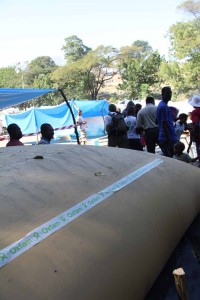A world turned upside down

Oxfam America’s Coco McCabe is one of several Boston-based colleagues in Haiti to help with the relief effort, where they join 200 Oxfam staff already on the ground. Here’s her latest update, dated January 21.
Massive iron gates. A leafy canopy. The cool quiet of a mountaintop. All the trappings of exclusivity greet visitors at the entrance of the Petionville Club, a place only the elite of Port-au-Prince probably ever had access to before.
But now, the world has turned upside down—for everybody.
Beyond the gates, about 50,000 people are now camped, shelter-by-homemade-shelter, across the hills of the nine-hole golf course. Military gear is piled high on the tennis courts. The swimming pool sits half drained. And a row of aid cars, uniformly white, line the driveway. Luxury couldn’t be further from the reality here.
The 7.0-magnitude quake that wrecked huge swaths of this capital city has made securing even the basics a daily challenge for many people. Water to drink. Food to eat. A dry place to sleep. These are the luxuries people are scrambling for now inside the gates of the Petionville Club.
We toured the perimeter of the grounds today on a mission to solve a problem that is growing by the day as the ranks of the camp swell. Nowhere on this 27-hectare site is there a latrine for the displaced people to use. Tens of thousands camped out and not a toilet to share between them here. The consequences are obvious—and potentially disastrous. Without proper sanitation, the risk of diseases skyrockets.

We picked our way gingerly along a slope above the shelters. This was one of the open defecation areas for the camp, and the smell was sharp–as sharp as the indignity this situation has imposed on so many.
Oxfam’s urgent task now is to get some latrines built, and by the end of our hike we had identified four potential locations.
As we trudged off the slope and onto a road that wound through the golf course, the throb of camp life engulfed us. Generators roared. Choppers whirled over head. Water from Oxfam taps splashed into buckets. Rap music blared. Babies cried. People shouted above the din. Kids laughed. And all along a stretch of the road, commerce thrived. Neat stacks of fruits and vegetables, heaps of charcoal, cooked food, packaged edibles–all of it was for sale by enterprising residents who are finding a way to keep on going despite the devastation in their lives and in the city around them.
Save lives now by donating to Oxfam’s Haiti Earthquake Response Fund
Learn more about how Oxfam is responding